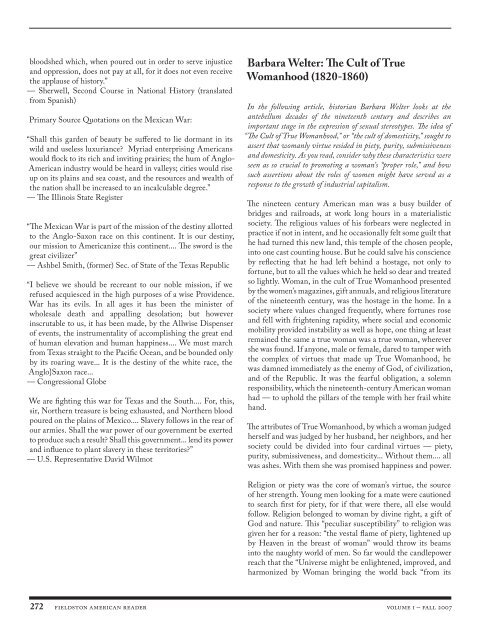fieldston american reader volume i â fall 2007 - Ethical Culture ...
fieldston american reader volume i â fall 2007 - Ethical Culture ...
fieldston american reader volume i â fall 2007 - Ethical Culture ...
- No tags were found...
Create successful ePaper yourself
Turn your PDF publications into a flip-book with our unique Google optimized e-Paper software.
loodshed which, when poured out in order to serve injusticeand oppression, does not pay at all, for it does not even receivethe applause of history.”— Sherwell, Second Course in National History (translatedfrom Spanish)Primary Source Quotations on the Mexican War:“Shall this garden of beauty be suffered to lie dormant in itswild and useless luxuriance? Myriad enterprising Americanswould flock to its rich and inviting prairies; the hum of Anglo-American industry would be heard in valleys; cities would riseup on its plains and sea coast, and the resources and wealth ofthe nation shall be increased to an incalculable degree.”— The Illinois State Register“The Mexican War is part of the mission of the destiny allottedto the Anglo-Saxon race on this continent. It is our destiny,our mission to Americanize this continent.... The sword is thegreat civilizer”— Ashbel Smith, (former) Sec. of State of the Texas Republic“I believe we should be recreant to our noble mission, if werefused acquiesced in the high purposes of a wise Providence.War has its evils. In all ages it has been the minister ofwholesale death and appalling desolation; but howeverinscrutable to us, it has been made, by the Allwise Dispenserof events, the instrumentality of accomplishing the great endof human elevation and human happiness.... We must marchfrom Texas straight to the Pacific Ocean, and be bounded onlyby its roaring wave... It is the destiny of the white race, theAnglo}Saxon race...— Congressional GlobeWe are fighting this war for Texas and the South.... For, this,sir, Northern treasure is being exhausted, and Northern bloodpoured on the plains of Mexico.... Slavery follows in the rear ofour armies. Shall the war power of our government be exertedto produce such a result? Shall this government... lend its powerand influence to plant slavery in these territories?”— U.S. Representative David WilmotBarbara Welter: The Cult of TrueWomanhood (1820-1860)In the following article, historian Barbara Welter looks at theantebellum decades of the nineteenth century and describes animportant stage in the expression of sexual stereotypes. The idea of“The Cult of True Womanhood,” or “the cult of domesticity,” sought toassert that womanly virtue resided in piety, purity, submissivenessand domesticity. As you read, consider why these characteristics wereseen as so crucial to promoting a woman’s “proper role,” and howsuch assertions about the roles of women might have served as aresponse to the growth of industrial capitalism.The nineteen century American man was a busy builder ofbridges and railroads, at work long hours in a materialisticsociety. The religious values of his forbears were neglected inpractice if not in intent, and he occasionally felt some guilt thathe had turned this new land, this temple of the chosen people,into one cast counting house. But he could salve his conscienceby reflecting that he had left behind a hostage, not only tofortune, but to all the values which he held so dear and treatedso lightly. Woman, in the cult of True Womanhood presentedby the women’s magazines, gift annuals, and religious literatureof the nineteenth century, was the hostage in the home. In asociety where values changed frequently, where fortunes roseand fell with frightening rapidity, where social and economicmobility provided instability as well as hope, one thing at leastremained the same a true woman was a true woman, wherevershe was found. If anyone, male or female, dared to tamper withthe complex of virtues that made up True Womanhood, hewas damned immediately as the enemy of God, of civilization,and of the Republic. It was the fearful obligation, a solemnresponsibility, which the nineteenth-century American womanhad — to uphold the pillars of the temple with her frail whitehand.The attributes of True Womanhood, by which a woman judgedherself and was judged by her husband, her neighbors, and hersociety could be divided into four cardinal virtues — piety,purity, submissiveness, and domesticity... Without them.... allwas ashes. With them she was promised happiness and power.Religion or piety was the core of woman’s virtue, the sourceof her strength. Young men looking for a mate were cautionedto search first for piety, for if that were there, all else wouldfollow. Religion belonged to woman by divine right, a gift ofGod and nature. This “peculiar susceptibility” to religion wasgiven her for a reason: “the vestal flame of piety, lightened upby Heaven in the breast of woman” would throw its beamsinto the naughty world of men. So far would the candlepowerreach that the “Universe might be enlightened, improved, andharmonized by Woman bringing the world back “from its272 <strong>fieldston</strong> <strong>american</strong> <strong>reader</strong> <strong>volume</strong> i – <strong>fall</strong> <strong>2007</strong>
















